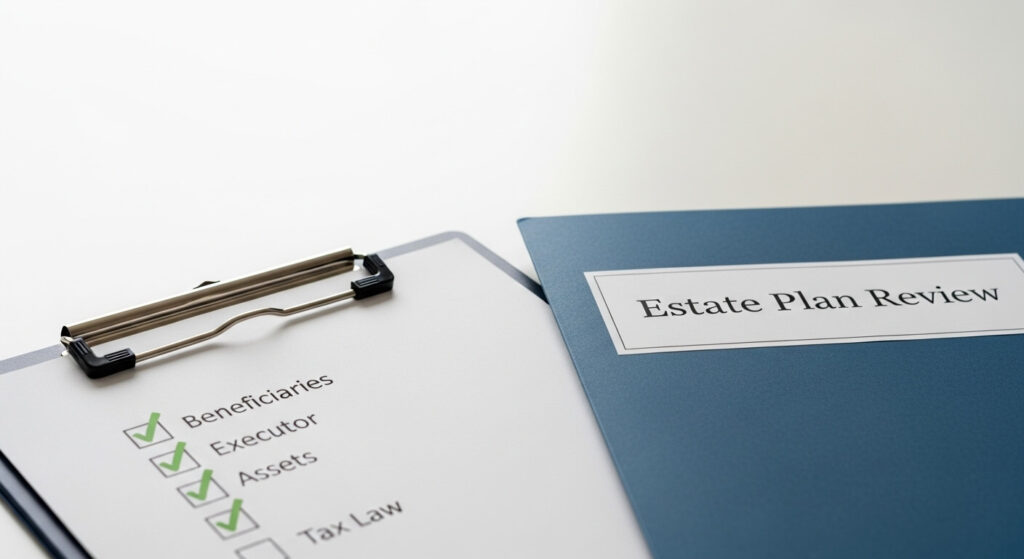Estate planning is crucial for carrying out your wishes and caring for your loved ones when you can no longer do so. However, creating an estate plan is not a one-time event. It is a process that requires regular review and updates to adapt to changes in your life circumstances, laws, and regulations.
As an individual, you may wonder how often you should review or update your estate plan. The general recommendation is to revisit it every three to five years or whenever a significant life change occurs. Major life events such as marriage, divorce, the birth of a child, or the acquisition of substantial assets should prompt a review to ensure that it still aligns with your current intentions and goals.
An attorney with experience in estate planning can guide you through reviewing and updating your estate plan. They can help you identify any necessary changes, address legal concerns, and ensure that your estate plan reflects your current wishes and complies with the latest laws and regulations. Regularly consulting with an attorney is essential to protect your assets and provide for your loved ones effectively.
Major Life Events That Trigger the Need for an Update

Life is full of unexpected twists and turns, and planning for whatever comes your way is essential. Regarding your estate plan, major life events can serve as triggers, highlighting the need for an update. These events can range from joyful occasions like marriage or the birth of a child to more challenging circumstances like divorce or the passing of a loved one. Each milestone can significantly impact your estate plan, making reviewing and updating your documents crucial.
For instance, getting married is a time of celebration and unity, but also signifies a legal change. In many states, your spouse has certain rights and entitlements that your estate plan should reflect. Updating your will or trust to include your spouse as a beneficiary or appointing them as a decision-maker in your power of attorney documents ensures their legal rights in the event of your passing or incapacity.
Conversely, divorce is a challenging life event that requires a thorough review of your estate plan. You can remove your ex-spouse as a beneficiary or executor in your will and make adjustments to ensure that your plan distributes your assets according to your current wishes. Failing to update your estate plan post-divorce may result in unintended consequences, such as your ex-spouse inheriting assets you intended for someone else.
The Consequences of Failing to Update a Will or Estate Plan
Many individuals overlook the importance of regularly reviewing and updating their wills or estate plans. However, failing to do so can have significant consequences that may impact you and your loved ones in the future. Keeping your estate plan up-to-date is crucial to accurately reflect your wishes and ensure they are legally binding. Without regular reviews and updates, you risk facing various potential pitfalls that complicate the distribution of your assets and the execution of your final wishes.
One of the most significant consequences of neglecting to update your will or estate plan is the possibility of outdated information leading to unintended outcomes. Life is dynamic, and circumstances can change unexpectedly. Without revisiting your estate plan regularly, you may fail to account for new assets, changes in family dynamics, or changes to relevant laws. This carelessness can result in your will or estate plan not distributing your assets as you intended, excluding your beneficiaries, or legal disputes arising among family members. By working with a skilled attorney to review and update your estate plan, you can prevent undesirable consequences and ensure that legal documents accurately reflect your wishes.
Furthermore, failing to update your estate plan can also lead to missed tax efficiency and asset protection opportunities. Tax laws and regulations are subject to change, and what may have been a tax-efficient strategy in the past can become obsolete or even detrimental over time. By regularly reviewing your estate plan with an experienced attorney, you can identify opportunities to minimize tax liabilities, protect your assets from creditors, and maximize the value of your estate for your beneficiaries. Estate planning is not a one-time event but rather an ongoing process that requires attention to detail and proactive maintenance to adapt to changing circumstances and laws.
Not Updating a Will or Estate Plan Can Lead to Disputes
Disputes between beneficiaries and family members are something that you want to avoid at all costs. Probate litigation can be contentious and expensive, resulting in a permanent breach in family relations. Old information in the will can make life much more difficult for the estate executor. In turn, the beneficiaries may become frustrated and question what the executor is doing. Without clear instructions and up-to-date provisions, there is a higher likelihood of misunderstandings, disagreements, and legal battles over inheritances and asset distribution.
In a worst-case scenario, one or more beneficiaries may file a lawsuit against the executor, causing them to use estate assets to pay an attorney to defend the case. The executor may even become personally liable for damages from their own pocket when they have breached their fiduciary duties.
An experienced estate planning lawyer can provide valuable guidance and experience on estate planning laws and regulations. They can help you assess your current situation, identify any changes that may impact your estate plan, and make necessary adjustments to protect your assets and legacy. By taking proactive steps to keep your will and estate plan up to date, you can minimize the risk of disputes and provide your loved ones with the clarity and peace of mind they deserve during a challenging time.
Key Elements to Review in Your Estate Plan

A comprehensive estate plan is crucial when safeguarding your assets and ensuring your will or estate plan carries out your final wishes. However, simply creating an estate plan is not enough. Regularly reviewing and updating your plan is essential to ensure it remains relevant and reflects your current circumstances. You should review your estate plan periodically, even if no single life event necessitates the review. Establish a periodic interval in which you conduct a comprehensive and holistic review of your estate plan.
One key element to review in your estate plan is the list of beneficiaries. Life is ever-changing, and relationships evolve. Ensuring that your chosen beneficiaries are still the individuals you wish to inherit your assets is vital. You may have beneficiaries in trusts, wills, and transfer-on-death accounts. What you have down on paper is what the financial institution or executor must follow, regardless of the circumstances. Regularly reviewing and updating this list can prevent unintended consequences and distribute your assessments according to your wishes.
The designated executor or trustee is another vital aspect to review in your estate plan. These individuals are significant in administering your estate and managing your assets. It is essential to review whether the individual you initially appointed is still the most suitable candidate for the job. Life circumstances can change, and you should ensure that the executor or trustee is still willing to fulfill their responsibilities. You may need to designate a new executor who can better handle the duties of administering your estate according to the law.
Additionally, reviewing and updating your estate plan in light of any changes in laws or regulations is essential. For example, tax laws may change and require you to amend your estate plan to comply with tax laws and to save your family money on tax obligations. Estate planning laws are subject to amendments, and what was compliant when you initially created your plan may no longer be valid. Regularly reviewing your estate plan with an attorney can help ensure it is in line with current legal requirements and can help avoid potential complications down the road.
Finally, your financial situation can change over the years, and increased wealth can mean that you need more solutions. While you may have previously had a will, making more money can indicate that it is in your interests to establish a trust to take care of your beneficiaries. At that point, you may decide that your family should stay out of probate, and you can do that through a trust.
Probate is the court-supervised process of validating a will and distributing assets according to its terms. This process can be time-consuming, costly, and open to public scrutiny. On the other hand, a trust is a private legal arrangement where a trustee manages assets for the benefit of beneficiaries. Trusts can help avoid probate, maintain privacy, and provide more control over how parties distribute and manage the assets. Choosing between probate and a trust depends on your unique situation and goals. An experienced attorney can create a plan that best suits your needs.
By regularly reviewing these key elements in your estate plan, you can uphold your final wishes and protect your assets. Consulting with an attorney can provide peace of mind and guidance in estate planning. All it may take is a quick conversation with the estate planning attorney to know whether you need to make changes and what changes you need to make. Of course, if you need to make amendments to your estate plan, your attorney can help you execute the necessary documents, and they can ensure that you complete the process correctly.
An Estate Planning Lawyer Can Ensure Your Will and Trust Are Up to Date
Ensuring that your will and trust are up to date may not be at the top of your to-do list, but it is a crucial aspect of estate planning. Regularly reviewing and updating these critical documents protects your wishes according to your current circumstances and preferences.
When you work with a knowledgeable attorney to keep your will and trust current, you can take advantage of the many benefits that come with it. For instance, updating your estate planning documents allows you to account for family dynamics, assets, or even changes in the law. Doing so can prevent future conflicts or misunderstandings among your loved ones.
Furthermore, keeping your will and trust up to date can ensure you maximize the benefits of your estate plan. An attorney can assist you in identifying new planning opportunities or strategies that align with your objectives and current financial situation. This proactive approach can lead to tax savings, asset protection, and a smoother distribution of your assets when the time comes.
By retaining an attorney to guide you through regularly reviewing and updating your will and trust, you can have peace of mind knowing that your estate plan accurately reflects your wishes. Additionally, staying proactive in this regard can save your loved ones time, money, and stress in the long run, as it ensures a clear roadmap for the administration of your estate.
How an Estate Planning Attorney Can Help
Planning for the future can be overwhelming and complicated, especially regarding estate planning. An estate planning lawyer can be a valuable resource to help guide you through the process.
An experienced estate planning attorney can provide personalized advice for your specific needs and goals. They can explain complex legal requirements and ensure your estate plan complies with state laws. By working with an attorney, you can protect your assets and ensure that your loved ones receive what they need in the event of your passing.
Furthermore, an estate planning attorney can help you anticipate and plan for potential changes in your life, such as marriage, divorce, birth of a child, or acquisition of new assets. By regularly reviewing and updating your estate plan with the guidance of an attorney, you can ensure that it remains current and relevant to your circumstances. This proactive approach can help you avoid costly mistakes and legal challenges down the road.
An estate planning attorney can also minimize tax liabilities and avoid potential disputes among beneficiaries. By proactively addressing these issues under the guidance of a knowledgeable attorney, you can achieve peace of mind knowing that your estate is in capable hands. Do not hesitate to seek the assistance of an estate planning lawyer to secure your legacy and protect your loved ones.


